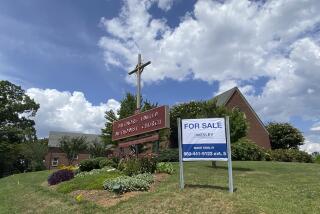Salary Survey Finds Anguish Among Evangelical Ministers
NEW YORK — They do not like to talk about money from the pulpit, and asking for a raise makes many pastors uncomfortable.
But when they leave their offices at night, drive by their neighbors’ nicer houses and pull their used cars into their driveways, financial issues can no longer be easily dismissed.
In a poll of nearly 600 evangelical clergy, more than two-thirds of the ministers surveyed said their families experience at least some tension about not having enough money and two-thirds reported being anxious about their financial future.
Nearly half of all ministers said they thought of leaving the ministry for a better-paying job in the last year, according to the survey released recently by Leadership magazine.
Meanwhile, 38% of all churches have no policy for giving their pastors raises, and the policy at an additional 1 in 5 churches is to give the pastor a cost-of-living raise when the church can afford it.
“There’s still the impression--at least among the laity--that you pay the pastor as little as possible, not as much as possible,” said David Goetz, associate editor of Leadership.
Christianity Today mailed surveys last summer to 1,200 subscribers of its magazines Leadership, Christianity Today and Your Church. Researchers received 594 responses.
Overall, pastors reported receiving a median base salary of $25,000. Adding in the housing allowance raised the median compensation to about $33,000, well below the median salaries of professionals in other fields.
The rare look into the financial lives of pastors revealed a modest lifestyle. Pastors reported spending a median amount of $100 eating out each month and only $50 a month on entertainment.
Despite modest salaries, 63% tithed 10% of their pretax income to the church, and an additional 13% tithed 10% of their after-tax income.
The survey showed that ministers are not uncomfortable practicing what they preach, but rather preaching what they practice.
So although 3 in 4 clergy give 10% to the church, half of the ministers responding to the survey said they preached about tithing to their congregation once a year or less.
It is even harder for clergy to stand up for themselves financially.
Ninety percent of the ministers surveyed said it is appropriate for a pastor to ask for a raise. Within that 90%, however, 65% have never asked for an increase.
Of those clergy who did ask, 65% were given the raise requested, and 22% were given a salary increase but not the amount requested.
“The bottom line is, if you ask, you receive,” Goetz said. “Nobody is going to bring it to you. You are on your own.”
In general, higher-paid pastors were satisfied with their salaries. Eighty-two percent of pastors making $32,000 a year or more in salary and housing allowance said they were fairly paid. However, 48% of pastors making $18,400 or less said they were underpaid or severely underpaid.
Although ministers may be relatively quiet from the pulpit and in the church boardroom about money, the low salaries are taking a toll.
In the Leadership survey, 49% of clergy said that at least once a year they consider leaving the ministry for a better-paying position, including 1 in 4 who say they consider dropping out twice a year or more.
And seminaries are no longer attracting the cream of college graduates.
“The best and the brightest are not going into pastoral ministry these days,” Goetz said.
Given the overall state of church finances, the problem does not lend itself to easy solutions.
A quarter of the pastors surveyed said their church finances were a little shaky, and an additional 13% said their churches were “living on the edge” financially.
Lyle Schaller, a church growth consultant, said a lot of smaller churches who have full-time, fully credentialed pastors cannot afford to pay them professional salaries.
“It’s not so much, ‘Reverend, we don’t think you deserve it.’ It’s, ‘Reverend, we don’t have the money to give it,’ ” Schaller said.
More to Read
Sign up for Essential California
The most important California stories and recommendations in your inbox every morning.
You may occasionally receive promotional content from the Los Angeles Times.










